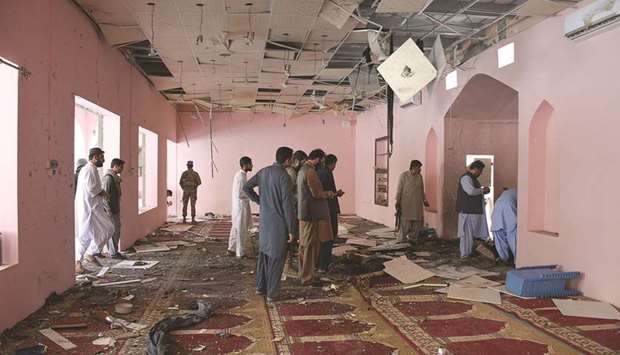At least two people were killed and more than two dozen injured by a blast during Friday prayers at a mosque in Quetta, officials said.
Police chief Abdur Razzaq Cheema said the explosion – the latest violence in a string of attacks in restive Baluchistan province – was caused by a remotely detonated bomb.
“We have received two dead bodies and 28 injured,” Dr Mohamed Waseem in Quetta’s Sandeman hospital told AFP, adding that 12 patients were in a serious condition.
There have been no claims of responsibility for the incident.
The bomb went off in the main praying hall of the Rehmania mosque in Quetta’s Pashtoonabad area, local police official Behram Khan said.
Earlier, police said the bomb detonated outside the compound.
The attack occurred half an hour ahead of the scheduled prayer, meaning that only a few dozen people were present at the mosque, another police official, Iftikhar Ahmed, told DPA.
More than 5,000 people usually attend the event.
“It would have been disastrous had the bomb gone off during the prayer,” Ahmed said.
The mosque’s prayer leader was one of the dead, but it was not immediately known whether he was the target, Ahmed added.
Quetta Deputy Inspector General (DIG) Abdul Razzaq Cheema said that out of 618 mosques, 100 have been provided with security.
He added that 1,500 police officials have been posted across the city.
Baluchistan Chief Minister Jam Kamal Khan Alyani condemned the blast and summoned a report on the incident.
He expressed grief over the deaths and multiple injuries caused by the blast.
“Those who make innocent people the target of terrorism in this blessed month and on this blessed day deserve a severe punishment,” he said, while ordering security measures in the city to be further strengthened.
In a post shared on Twitter, State Minister for States and Frontier Regions Shehryar Afridi condemned the attack, saying: “Another nefarious act by evil forces in Quetta.”
Even during Ramadan they choose to target civilians praying in a masjid, Afridi wrote, adding: “It is so painful [and] astonishing to see that evil forces are targeting innocent civilians.”
National Assembly Speaker Asad Qaiser and Deputy Speaker Qasim Suri also strongly condemned the attack and said that those who attack mosques and other places of worship are enemies of humanity and have no relation to any religion.
Leader of the Opposition in the National Assembly Shehbaz Sharif also condemned the attack.
“The person who attacks the house of God on a Friday in the month of Ramadan cannot be a Muslim,” he said, adding that the continuous rise in terrorist incidents was extremely worrisome.
Pakistan Peoples Party (PPP) co-chairman Asif Ali Zardari also issued a condemnation and stressed the need for “eliminating the nurseries that nurture extremist ideologies”.
“Those who spill the blood of humans are unforgivable,” he said and urged the government to provide protection to the people.
The latest attack comes weeks after a suicide blast claimed by the Islamic State (IS) group in Quetta killed at least 20 people.
Baluchistan, Pakistan’s largest and poorest province – bordering Afghanistan and Iran – is rife with Islamist, separatist and sectarian insurgencies, even as incidents of violence have significantly dropped elsewhere in Pakistan.
Militants still retain the ability to carry out attacks, including on major urban centres and tightly-guarded targets, and analysts have long warned that Pakistan is yet to tackle the root causes of extremism.
Baluchistan is key to the China-Pakistan Economic Corridor (CPEC), part of Beijing’s Belt and Road initiative.
The CPEC seeks to connect China’s western province of Xinjiang with Gwadar, giving Beijing access to the Arabian Sea.
The separatists usually attack energy infrastructure and the security forces, while the religious militants usually attack government targets and members of the Shia Muslim minority.

Security officials examine the interior of the mosque in Quetta following the blast.
